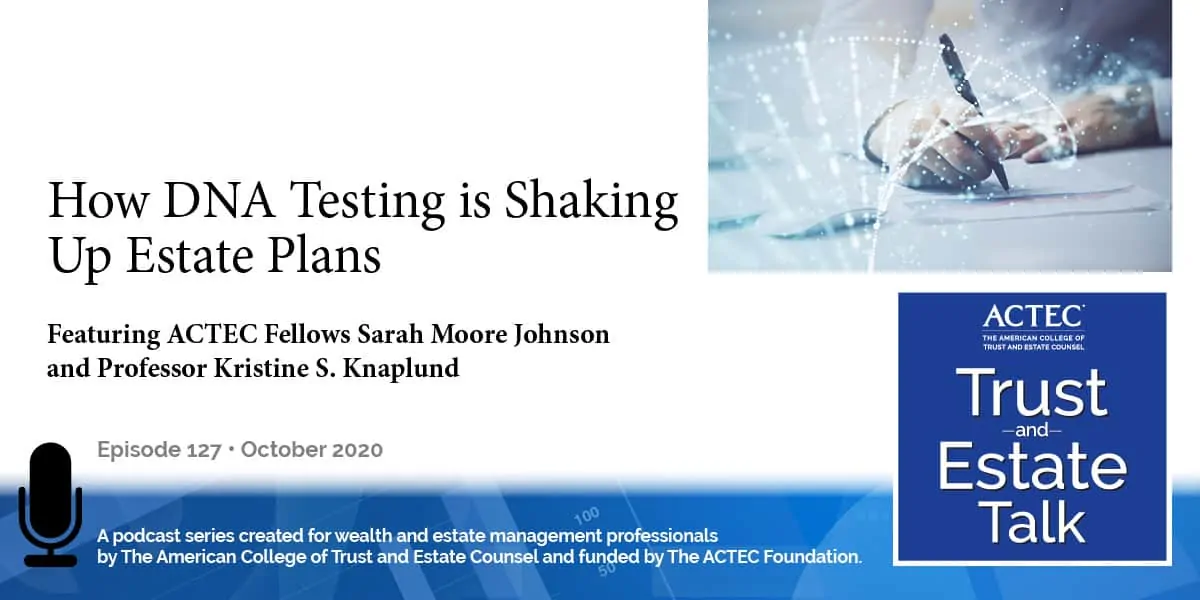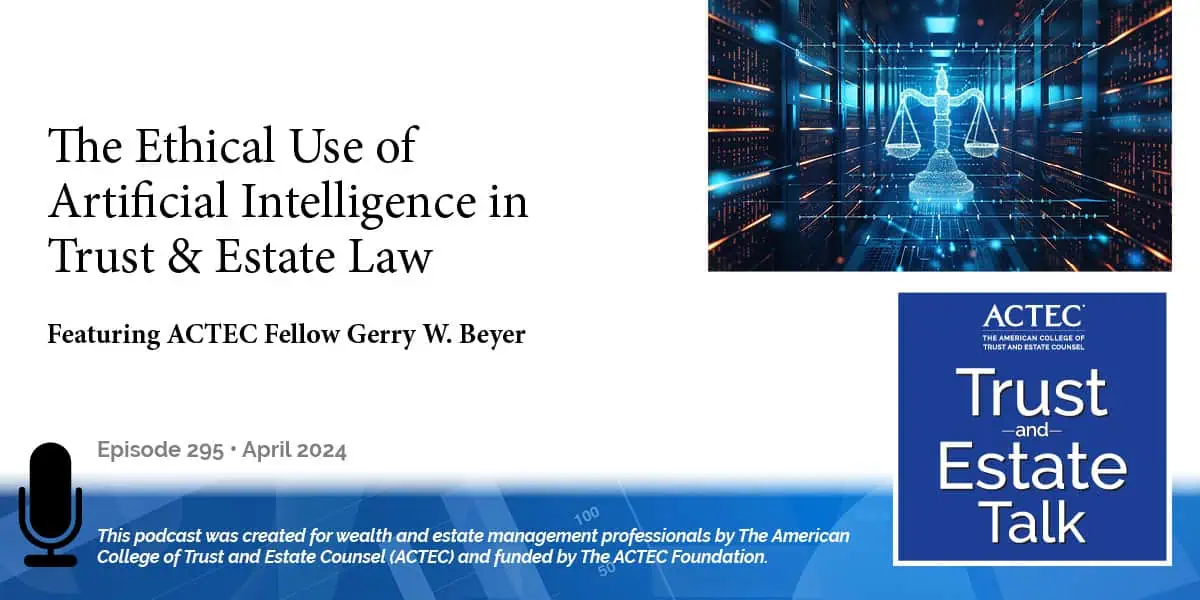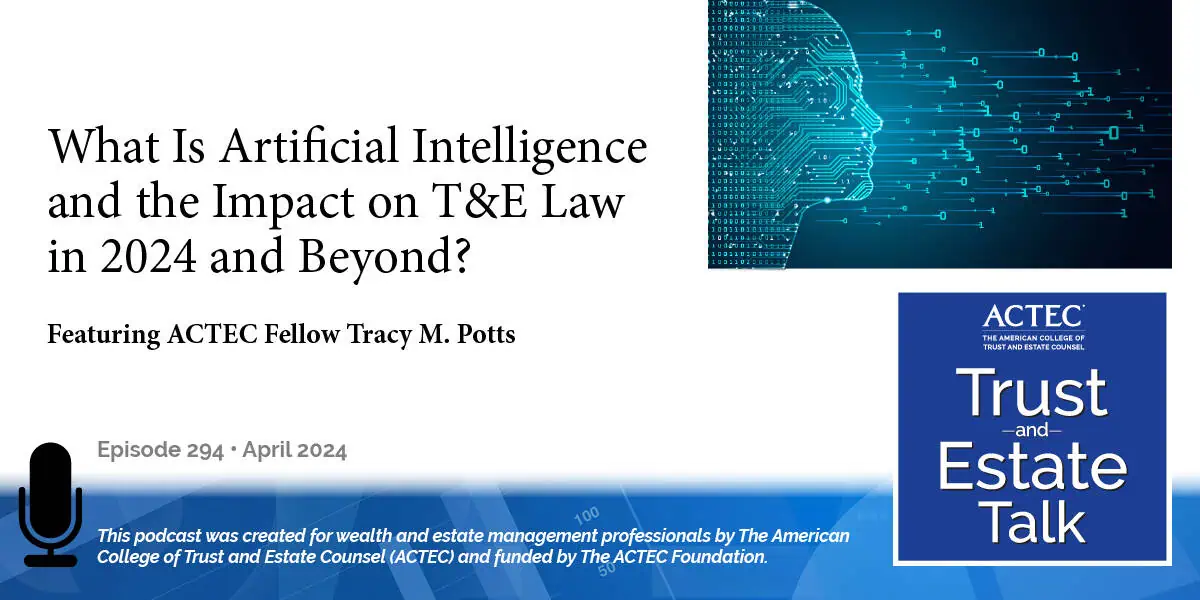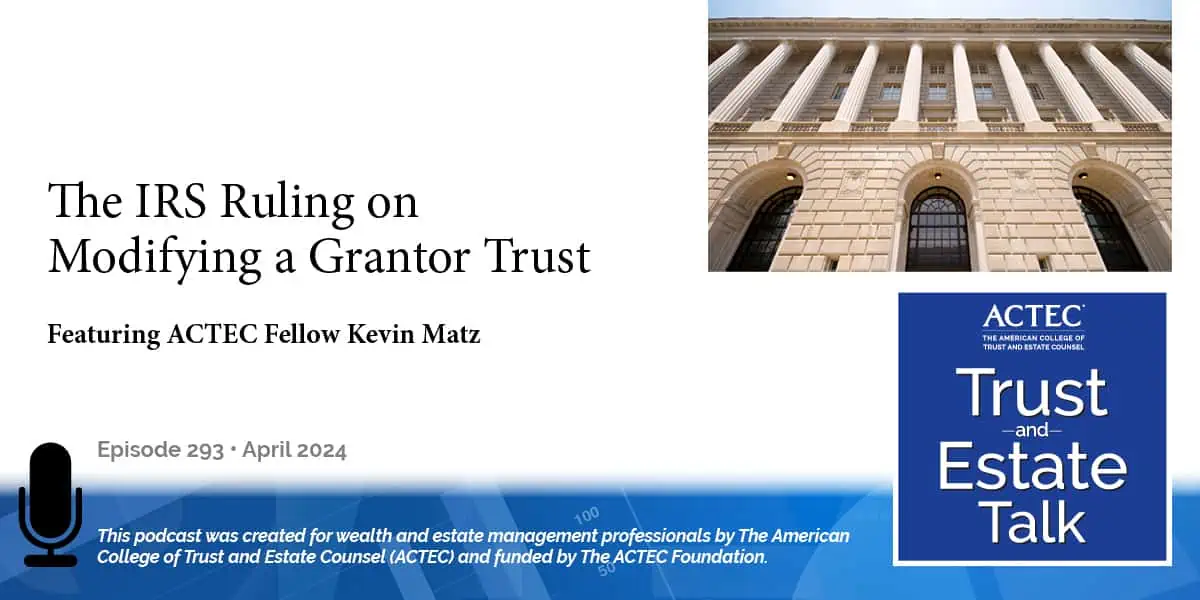How DNA Testing is Shaking Up Estate Plans | DNA Testing for Inheritance

“How DNA Testing is Shaking Up Estate Plans,” that is the subject of today’s ACTEC Trust & Estate Talk.
Transcript/Show Notes
This is Susan Snyder, ACTEC Fellow from Chicago. DNA test kits may have been one of the most popular holiday presents last year, but the gift can go awry when unexpected genetic relations are revealed. To give us more information on ART or Assisted Reproductive Technology and the effect of DNA testing in the estate planning arena, you will be hearing today from ACTEC Fellows, Professor Kris Knaplund of Malibu, California and Sarah Johnson of Washington D.C. Welcome.
Thank you. ART has been around for about 40 years, if you can believe it, but our other topic, direct-to-consumer genetic test kits have only been around for about seven years. We found that these two topics are like concentric circles. The overlap in the middle is the topic of how DNA test kits are bringing to light unconventional and, in some cases, intentionally covert ways that we humans have been creating life and building families, whether through donor sperm and eggs, extramarital affairs, or one-night stands. In some cases, we have adopted new laws and attempt to keep up, but for the most part, we are trying to apply old laws to these new and unusual fact patterns with limited success. Our presentation at ACTEC this year will focus on three hypotheticals. Kris and I, today, will pull out some of the most important points from these hypotheticals.
DNA and Intestacy Laws
The first one, with respect to DNA test kits, and surprise heirs they can reveal, is that it is important for us to revisit our intestacy laws. One of the most surprising things in our intestacy laws — I remember my law school class where we learned this — is that whole blood relatives are treated the same as half-blood relatives or vice versa. Half-blood relatives are treated the same as whole blood relatives when it comes to inheriting through intestacy. That is the majority position in most states. There are some states that deviate from this standard and those states take a couple of different approaches. The first approach is to treat the half-blood siblings or nieces and nephews as getting a half of a share and then the whole bloods receiving a whole share. There are some interesting states that have an ancestral property exception where if the half-blood relative will inherit the same as the whole blood, except for property that has passed from an ancestor of the decedent who is not shared in common with the half-blood relative. And in that case, that ancestral property will not be passing to the half-blood.
Nevada just repealed its ancestral property exception, because it is a lot like divorce litigation. You have to trace property and figure out what was commingled. And then there is Mississippi that treats half-bloods and whole bloods [differently]. Half-bloods are not given any preference under the law, unless there are no whole blood siblings that could take or siblings or nieces or nephews. We find that with the surprise relatives that pop up through DNA test kits like Ancestry and 23andMe, the problem really comes not where you have your main relatives. Your parents and the kids are pretty much well known, but the problem comes when you get into kind of more of a final taker scenario, ultimate distribution where you are having to look to who are your siblings and who are your nieces and nephews; and that is why I have been focusing on nieces and nephews.
Another thing that comes up with these surprise relatives is the problem of class gifts. In one of our hypos, we had an aunt who had learned through DNA testing that her mother had two children out of wedlock before her mother got married. Her mother had gone to the grave with this information and never told a soul, but these relatives popped up on ancestry.com. So, this woman was a very exuberant Texas lady, and she was super excited to have two new nieces and nephews that she found through DNA testing. She called them up. She invited them to the family reunion. She told all of her friends that she had new nieces and nephews. They ended up becoming Facebook friends and texting but were not really part of the family, and she did have three nieces and nephews who were the descendants of her brother. So, she left her entire estate to “my nieces and nephews together or the survivor of them.” And would the ancestors who had been discovered through the DNA test kits be included in this class gift? So, we had to look and see, — how do we analyze class gifts these days? First, we needed to see if it was actually a specific bequest to certain individuals or if it was really a class gift; and if it was, then that class stays open until you pass away, regardless of when you executed your will or revocable trust. So, here, if the surprise relatives could be proven to be family under the intestacy statute, then they would be included in the class. So, one of the lessons to us as attorneys is that we really need to be careful in drafting class gifts. Do we need a class gift in the first place, or can we use a specific bequest instead? And if we do use a class gift, then we should always relate back to the parent whenever we can so that our definition of parent, child and descendant, that is included in our forms, will control.
So, you want to avoid gifts to a class that are on a horizontal level such as brothers, sisters, siblings, nieces, and nephews and instead leave the bequest or leave the class gift to the descendants of my brother, the descendants of my siblings — that sort of thing, per stirpes. Kris is going to tell us a little bit about some of the materials that were covered in another one of our hypos.
Surrogacy and Inheritance
Thank you, Sarah. Well, in hypo three, we were talking about a surrogacy contract. This is a traditional surrogacy where a woman agreed to use her own egg for the benefit of her brother, who was married to a man. The husband of her brother provided the sperm and the surrogacy contract said she could not travel outside of Connecticut, where the surrogacy agreement was valid, in her third trimester. And, of course, she did. Went to New York where surrogacy agreements are not recognized. She was hit by a bus—killed. The baby was saved. Now, under New York law, the birth certificate was issued in the name of the woman who gave birth and her husband, which would be true in a number of states, regardless of the surrogacy agreement.
Now, you can prove through 23andMe that the husband of her brother is actually the father, but what will that solve for you? Can the brother and his husband adopt the baby? Can they go to Connecticut and get a post-birth order? Or will they have to adopt their New York law, even though it won’t look at the surrogacy agreement or enforce it? It could allow an adoption if it is in the best interests of the child. Should it be with the husband of the mother, who is not genetically related to the child, or should the child be with the father and his husband who were the intended parents? Under Connecticut law, they might be more likely to honor the surrogacy agreement, issue a post-birth order or allow them to adopt.
Now, will we also enforce — what about that travel ban? Those are typically, in these surrogacy agreements, for the very reason that you saw here, that you do not want the surrogate traveling in the last trimester because we cannot really predict when the baby will be born. But we want to predict where it will be born. And so, the brother and his husband may well be able to get their damages for the costs of having to adopt the child, plus further emotional damages for that.
Another issue that sometimes comes up in this area is post-mortem conception. We used to see spouses and parents in the ER with the person just deceased, and they would ask that the sperm or the ova be retrieved after the person had died. And so obviously, there was a lack of consent on the deceased’s part that then they would freeze the material and use it later to have a child. Now 23andMe would prove genetically that is the child. But can it inherit? A lot of states now have statutes on that. The most comprehensive statutes require the decedent to give consent to use their genetic material after death, and they have to designate who will use it. The person who is given the genetic material has to give notice to the probate court within so many months of the decedent’s death — they intend to use it. And then, they have to use it within a certain amount of time after death. If you have a statute like that, it means you don’t have to hold the estate open for a long period of time to see if the material is used and a child is born. So, Sarah will tell us a little bit about — what if there is genetic material frozen? Who gets it?
Frozen Embryo Inheritance
Right. So, right now in the United States alone, we have over one million frozen embryos waiting to be born, but unfortunately in a fair amount of time, people will pass away without having used those embryos. So, are the embryos part of the probate estate? Are they even property or are they people? States are taking different approaches on this. Louisiana has been the most extreme in creating a statute that says that embryos are actually people. And so, this has led to people hightailing it out of Louisiana when they want to go through fertility treatments because one wrong move that the doctor makes — he could be liable for malpractice if he damages those embryos. So, Louisiana’s one end of the extreme.
Very, very few states have any statutes on this, other than Louisiana. And so, we look to case law, and the case law that has really informed this decision has actually been divorce case law and not case law in the area of estates. So, when you are looking at this in a divorce context, courts have come out in different approaches, but mostly they look to see if there was a contract with the fertility clinic. That is the most important thing. If you have a client that comes in to see you and they have been through fertility treatments, you want to review the fertility contract to see what it says about what happens to frozen embryos in the event of the death of a party. If the contract is not clear or if the contract creates life, it says that the embryos can be used to create life after death, then you look to a balancing approach; and the courts will balance the interests of the person who wants to conceive the child with the interests of the person who does not. And you can imagine in a court case dealing with — somebody had passed away and there was a surviving spouse or a surviving partner. More likely than not, the courts would probably balance in favor of the surviving partner that wanted to give birth. So, that is an interesting aspect that we are following, and TBD.
Thank you both for giving us such important information on ART and DNA and how changing families are changing estate plans.
This podcast was produced by The American College of Trust and Estate Counsel, ACTEC. Listeners, including professionals, should under no circumstances rely upon this information as a substitute for their own research or for obtaining specific legal or tax advice from their own counsel. The material in this podcast is for information purposes only and is not intended to and should not be treated as legal advice or tax advice. The views expressed are those of speakers as of the date noted and not necessarily those of ACTEC or any speaker’s employer or firm. The information, opinions, and recommendations presented in this Podcast are for general information only and any reliance on the information provided in this Podcast is done at your own risk. The entire contents and design of this Podcast, are the property of ACTEC, or used by ACTEC with permission, and are protected under U.S. and international copyright and trademark laws. Except as otherwise provided herein, users of this Podcast may save and use information contained in the Podcast only for personal or other non-commercial, educational purposes. No other use, including, without limitation, reproduction, retransmission or editing, of this Podcast may be made without the prior written permission of The American College of Trust and Estate Counsel.
If you have ideas for a future ACTEC Trust & Estate Talk topic, please contact us at ACTECpodcast@ACTEC.org.
© 2018 – 2024 The American College of Trust and Estate Counsel. All rights reserved.
Latest ACTEC Trust and Estate Talk Podcasts

The Ethical Use of Artificial Intelligence in Trust & Estate Law
A law professor offers insights into the risks, rewards, duties and ethical considerations of lawyers using AI in their T&E practices.

What Is Artificial Intelligence and the Impact on T&E Law in 2024 and Beyond?
A primer on the types and uses of AI, then a deeper dive into the impact on trust and estate law from types to applications to ethical considerations.

The IRS Ruling on Modifying a Grantor Trust
Explore the gift tax implications for trust beneficiaries modifying grantor trusts in IRS CCA 202352018, with nuanced analysis and estate planning insights.

